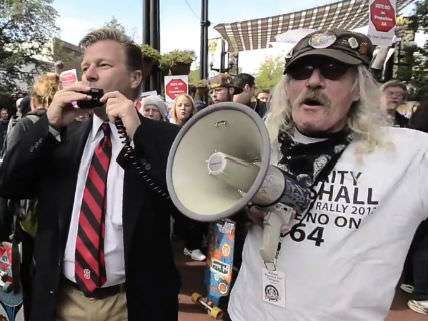Will Colorado's Pot Taxes Preserve the Black Market?

In less than a month, Colorado voters will decide whether to approve Proposition AA, which would authorize an excise tax of 15 percent and a sales tax of up to 15 percent on the marijuana that state-licensed stores are expected to start selling early next year. At the same time, Denver voters will decide the fate of Question 2A, which would authorize an additional sales tax of up to 15 percent imposed by the city. Those levies are in addition to the standard state sales tax of 2.9 percent and local sales taxes, which in Denver total 8 percent. If all these taxes are approved and legislators set them at the maximum authorized levels, legal pot in Denver—home to most of the state's medical marijuana centers, the only businesses that will initially be allowed to serve the recreational market—will be hit by a total sales tax of 38 percent, plus an excise tax of 15 percent. That's way too much, says Denver attorney Rob Corry, who calls the proposed weed levies "the largest tax increase in Colorado history."
Corry, who kicked off the No on Proposition AA campaign with a joint giveaway ("Free the weed!") at the Denver Civic Center last month, notes that Amendment 64, the state's marijuana legalization initiative, proposed taxing cannabis "in a manner similar to alcohol." Colorado's tax on beer is 8 cents a gallon, which adds maybe a penny to the price of a 12-ounce bottle. An 8 percent sales tax adds another 56 cents to the price of a $7 six-pack, so taxes represent 8.2 percent of the final price. What will the comparable figure be for marijuana at the maximum tax rates? Last April researchers at Colorado State University (CSU) estimated that a 15 percent excise tax plus a 15 percent sales tax would add about $29 to the price of an ounce. Based on their figures (which rely on assumptions about production cost and markup that may or may not prove accurate), a municipal marijuana tax of 15 percent and a standard sales tax of 8 percent would add another $36, for a total after-tax price of $222 per ounce, of which taxes would account for 29 percent. Is 29 percent "similar to" 8.2 percent? Corry thinks not, and he worries that excessively high taxes will perpetuate the black market.
The Medical Marijuana Industry Group and other backers of Proposition AA argue that the taxes are necessary to pay for the effective regulation that Amendment 64 promised and the Justice Department is demanding as a condition of letting Colorado's experiment proceed. To the contrary, Corry argues in a recent letter to John Walsh, the U.S. attorney for Colorado, high taxes will undermine regulation because "over-taxation creates a marijuana market ripe for takeover by the unregulated, untaxed, underground market." Corry wants Walsh to dispel the notion that the Justice Department favors a yes vote on Proposition AA. He argues that "specific past guidance from the U.S. Department of Justice would seem to indicate that in fact a 'No' vote on Proposition AA is favored by the Department."
While Corry is unlikely to get a response from Walsh, his concern that an overtaxed marijuana industry will have a hard time competing with black-market suppliers should not be lightly dismissed. From a consumer's perspective, something has gone terribly wrong if legal marijuana prices do not end up being substantially lower than black-market prices. But the extent of the continued black market will depend on several factors that are hard to predict. Will the state legislature and the Denver City Council raise taxes as high as authorized by voters and keep them there, or will they adjust the rates based on experience? Will the production cost for legal marijuana be as low as the CSU report assumes (around $600 a pound) or closer to the numbers used in projections by BOTEC, the consulting firm advising Washington's marijuana regulators (about $900 in one estimate, $1,400 in another)? According to one BOTEC projection, the after-tax retail price of marijuana in that state, which is imposing a 25 percent tax at the farm, wholesale, and retail levels, will be something like $482 an ounce. Another estimate, based on a higher production cost, puts the price of an ounce at $723. Those numbers are far higher than the prices reported by current marijuana buyers in Washington and Colorado ($238 on average for high-quality cannabis, according to the Price of Weed website). If the actual prices are anything like the projections, concedes BOTEC CEO Mark Kleiman, "that's a big problem." Given the tax rates permitted by Proposition AA and Question 2A, Colorado is asking for a similar problem.
Show Comments (17)